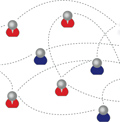 In 2010, Huibers worked with health authorities in the Netherlands to address a series of myths circulating on social media about cervical cancer vaccines. These myths included claims that the vaccine would lead to hair loss – a thought which struck fear into the hearts of the 12- to 14-year-old girls targeted by the immunisation drive – and stories of deaths related to vaccination.
In 2010, Huibers worked with health authorities in the Netherlands to address a series of myths circulating on social media about cervical cancer vaccines. These myths included claims that the vaccine would lead to hair loss – a thought which struck fear into the hearts of the 12- to 14-year-old girls targeted by the immunisation drive – and stories of deaths related to vaccination.
Peer pressure
Rather than run radio advertisements or asking experts to do TV interviews, the Dutch authorities asked parents and teenagers to torpedo falsehoods circulating online using Facebook, Twitter, blogs and chat fora.
“We mapped all the influencers and realised that there were basically only eight people in the Netherlands doing all the harm. We monitored messages on social media and asked mothers and girls to react to scare stories in language that our target group understands – the peer-to-peer can be very powerful,” Huibers told a workshop hosted by the ECDC at the European Health Forum in Gastein, Austria.
Christine Mosler, a prolific blogger and mother of four echoed Huibers’ advice. She said parents use social media for advice, support and company as well as for information. Mosler warned against health authorities launching awareness campaigns on social media unless they are prepared to engage.
“They need to enter the conversation rather than just dropping in information. It’s a two-way thing. Don’t just come in and tell me about vaccine safety; come in and discuss it with me,” she said.
Mosler said that while Twitter is a useful tool for “hooking people into a discussion”, blogging offers greater depth and more scope for storytelling.
Convenience is key
Robb Butler of WHO Europe said the Organisation was developing a network of bloggers who write about health issues. He said they are best-placed to communicate with parents who have questions about vaccination.
He said social media can play an important role in reaching the WHO target of eliminating measles and rubella by 2015, but he warned against placing too much stock in online communication tools.
“It’s about tackling complacency, convenience and competence. Convenience or access to vaccines is crucial. Ukraine has a measles crisis because it has no vaccines. The confidence and communication issues are irrelevant. We should also make is easier for parents to have their children vaccinated rather than requiring them to get a prescription, go to the pharmacist, store the vaccine in their fridge and make a follow-up appointment with the doctor,” said Butler.
He added that the WHO is hoping to make it easier for parents to track childhood vaccination by launching a new app next year which records immunization history across. However, Butler also noted that 30% of measles cases last year were in people aged 18 or older so reaching adolescents and young adults is also important.
Europe’s measles ‘shame’
ECDC Director Marc Sprenger said he hoped social media could play a role in reaching vulnerable populations, noting that even economically disadvantaged groups often have access to mobile phones and the internet.
“I feel very ashamed that last year we had 30,000 cases of measles – and it’s just so easy to prevent measles…. Nowadays we also have a very safe vaccine that is working against HPV [cervical cancer] but not all girls are using this vaccine – why not? We have to build trust in vaccination and social media can play an important role,” he said.
John Ryan, Acting Director of the European Commission’s public health division, said European Union member states are best-placed to develop social media tools. However, he noted that governments would need to see a robust business case for any new spending.
He also noted that national governments are responsible for health policy but said that the EU has a part to play. In light of measles outbreaks across Europe, Ryan said it was imperative that vaccination policy is on the agenda. To that end, the European Commission is hosting a conference on childhood immunization in Luxembourg on October 15 and 16.
Ryan said the Commission may also be able to make the case for immunization as a cost-saving preventative health measure when national governments consult Brussels on their annual budgets.





Maureen Fitzsimon
October 11th, 2012
Experts are often working 16 hour days,and are lucky to have any time at the weekend. They are far too busy actually advancing science to be worried about a few drongoes. It is fantastic that people whose skills are in communication and media, are able to get the message across.